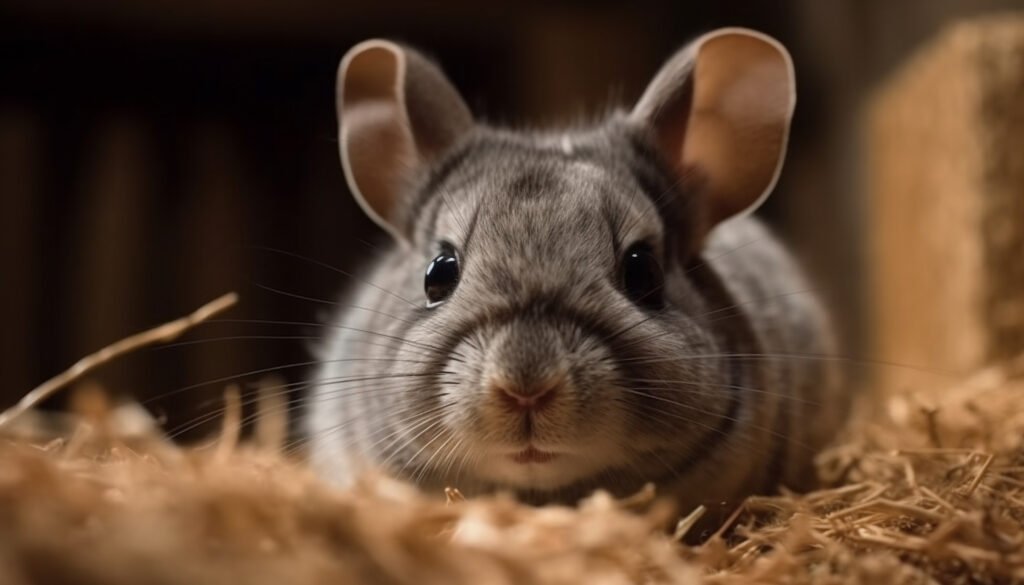If you are looking for a quiet, low-odor, and unique pet with its own personality, chinchillas are the perfect match. These small rodents are famous for their unbelievably soft fur and gentle nature. Native to the rugged Andes Mountains of South America, chinchillas are agile, social creatures that have adapted well to domestic life—if you are willing to meet their specific needs.
Chinchillas Are Agile, Quiet, And Incredibly Clean
Chinchillas are small rodents, typically weighing between 400 to 600 grams, roughly the size of a rabbit or small cat. Their powerful hind legs make them excellent jumpers—they can leap up to six feet in a single bound! This athleticism stems from their natural environment, where they live among rocky mountain slopes.
Unlike pets requiring frequent bathing or emitting a noticeable odor, chinchillas are naturally clean and virtually odorless. They often groom themselves and can be seen sitting upright using their front paws to nibble food or clean their faces.
Though adorable and social, chinchillas are also quite shy by nature. They do not tend to make much noise and prefer calm, predictable environments, making them better suited for adults or families with older children who understand the importance of gentleness.

Top 5 Fun Facts About Chinchillas
Let’s explore some unique and adorable facts about chinchillas that might just make you fall in love with them even more.
1. Baby Chinchillas Are Known As Kits
Yes, like baby foxes and rabbits, chinchilla babies are known as kits. Unlike many newborn rodents that are born hairless and blind, kits come into the world fully furred, with their eyes and ears wide open.
Weighing just 1 to 2 ounces (30–60 grams), these tiny creatures are remarkably self-sufficient from day one. Most chinchilla litters contain two kits, although it is possible for a female to give birth to anywhere from one to six. These little ones mature fairly quickly and usually reach sexual maturity at around eight months of age.
2. Dust Baths Are Their Spa Days
One of the most intriguing aspects of chinchilla care is their love for dust baths. That is right—unlike most pets that need water for bathing, chinchillas maintain their silky fur by rolling in fine dust. Their fur is so dense that getting wet is dangerous—it can trap moisture and lead to skin infections.
A proper dust bath helps absorb excess oil and moisture, keeping their coat soft and healthy. Experts recommend offering your chinchilla a dust bath two to three times a week. Too many dust baths, however, can lead to dry skin, so it is essential to strike a balance.
Pro tip: You can use a special container (around 6″x 6 “x12”) filled with 1–2 inches of chinchilla dust. Leave it in their cage for about an hour, then remove it to prevent overuse or contamination.
Note: Never substitute dust with sand. It can irritate their eyes, skin, and fur.
3. Their Fur Is The Softest In The Animal Kingdom—And That Is A Problem
Chinchillas have arguably the softest fur in the world—each hair follicle can produce up to 60 hairs, totaling about 20,000 hairs per square inch. This luxurious coat is both a blessing and a curse.
Unfortunately, the species’ fur value led to overhunting in the wild. Native to South America, wild chinchillas—especially the Chinchilla chinchilla species—have become endangered due to excessive fur trading and habitat destruction. Today, wild chinchillas are legally protected, but their populations continue to decline.
Most pet chinchillas are from the Chinchilla lanigera species, which has adapted to domestic environments, though they share many traits with their wild relatives.

4. They Live Longer Than Most Small Pets
When it comes to longevity, chinchillas outperform many of their rodent counterparts. In captivity, with proper care, they can live 10–15 years, and some even reach 20! This is significantly longer than the typical lifespan of guinea pigs (4–8 years) or hamsters (2–3 years).
Why do they live so long? One theory suggests that chinchillas develop more slowly, leading to a longer lifespan. Another possibility is that they are simply strong as a species, with fewer genetic health problems than other small mammals.
This long lifespan is something to consider seriously before adopting one. A chinchilla is a long-term commitment, but it is a journey full of joy and bonding for the right pet parent.
5. They Can Be A Perfect Addition To the Right Family
Chinchillas can make excellent pets if their needs are understood and respected. Here is what makes them ideal for some families:
- Quiet and low-maintenance: They are not vocal and do not smell.
- Clean: They rarely require cage cleaning more than once a week and can even be litter-trained.
- Bonding: They enjoy interacting with humans or a same-sex chinchilla companion.
- Simple diets: Mainly hay, quality pellets, and occasional treats like rose hips or dried herbs.
- Great for night owls: Chinchillas are crepuscular. It means that they are most active during dawn and dusk. If you are busy during the day, this could be the perfect pet for your schedule.
That said, chinchillas are not ideal for young children or homes with a lot of noise and chaos. They startle easily and may not tolerate too much handling unless they have been gently socialized.

Final Thoughts
Chinchillas are unique, fluffy companions that thrive on gentle care, regular routines, and dust baths. They are not just adorable—they are intelligent, tidy, and surprisingly long-lived for such small creatures. From their agile acrobatics to their incredibly soft coats, chinchillas bring a special kind of magic into any home that welcomes them.
A chinchilla could be your perfect pet if you are ready to commit to their specific care needs and can provide a calm, consistent environment. Just remember—while they might be small, the joy they bring is anything but.


